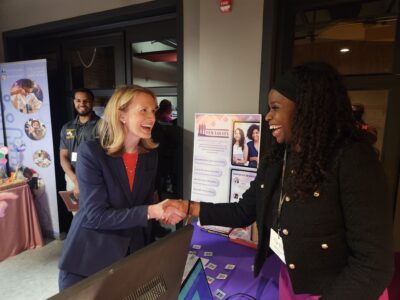The Voxel opened in 2020 on a belief that “technology is not artistically interesting in and of itself,” according to Ashworth.
The intersection of art, whether exhibited, public or performance-based, with technology is nothing new. Over the years, the two fields’ convergence has shaped creative genres, sparked concerns and served as a tool for artists and researchers alike.
Ashworth’s research lab, teaching classroom and arts venue serves as a hub for the research and development of Figure 53’s QLab. The software provides a way for venues to design and automate features like sound, video and projection in live shows. Figure 53 offers several tutorials for the platform on its YouTube page.
“So, we are a small company. We’re less than 20 people,” said Ashworth, who admitted that Figure 53 is “terrible at marketing. “The company that makes QLab — within the industry, we’re well-known, but outside of it, we’re not.”
He gave the example that Technical.ly had actually written about QLab “and didn’t know it”; according to him, QLab was used in a recent circus.
Like a circus promoter, Ashworth said he’s made some “wacky choices” as the owner of The Voxel that benefit the efforts of creatives in Baltimore.
“I can make these wacky choices as the owner of the company to make an investment that is not profit-driven, right?” he said. “This would never be made in a company where profit has to take priority. It’s just never what it is. It is effectively a nonprofit, and I can make that choice because I don’t have investors.”

Drone photo of The Voxel. (Courtesy David Brasington)
He believes this approach benefits the software’s influence in the space as he and his team can closely collaborate with artists, identifying and addressing potential issues with QLab.
“QLab is used in venues of all sizes. And for years and years and years, all of the work that we put into it, we could do from a desk [with] a pair of headphones and maybe a little extra equipment on the side,” said Ashworth. “We’ve gotten to the point where some of the stuff we want to add, you’ve really got to have a real theater to see if it’s working.”
That includes amenities like an audio system, which Ashworth said via email is “unique to Baltimore.” The setup involves a DS100 signal engine, flown subwoofers (as opposed to floor-mounted) and a projection-mapped stage floor.
For those who want to nerd out, read The Voxel’s technical manual
Ashworth is celebrating his 20th year in the software-for-shows business and highlighted that what’s offered at The Voxel isn’t available anywhere else in town. Even with the founder’s tech-savvy, he said that he finds art that focuses on tech for its own sake to be “uninteresting and unpersuasive.”
“Just as a human experiencing it, you know, it’s sort of like there’s not a lot of emotional content to technology per se,” he said. “So artists using it as a tool can be very gorgeous. But for its own sake, [it] is completely uninteresting to me.”
Now that a “horrifying” moment, when The Voxel closed due to the pandemic, is in the rearview, Ashworth now finds an objective in providing support to local producers and artists.
The Voxel’s artist residency
Katie Hileman, a University of Maryland, Baltimore County (UMBC) alum, founded Interrobang Productions in 2014 with four of her classmates.
“We’ve been figuring it out for 10 years now,” said Hileman, who identifies as fat and earned a master’s degree in theatre arts from Towson University. “It’s going to be our 10-year anniversary on Jan. 28, actually, and we really focus primarily on Baltimore artists, people in the region. We like to hire people who work here or who live here.”
“I feel like a lot of theater performance people feel like they’re trying to leave,” she added. “Everyone’s trying to leave Baltimore to go to, like, DC or New York. But we were like, ‘What if we can make space where people want to stay and work on new stuff?’ Because Baltimore is so receptive to like the new and the weird and the trying [of] things.”
On Friday, Hileman’s “I Will Eat You Alive,” a 70-minute play described on The Voxel’s website as addressing being fat and a woman in “the age of Ozempic,” opens at Ashworth’s research lab.

A scene from “I Will Eat You Alive.” (Courtesy Kiirstn Pagan)
From obesity treatment companies and wellness tech apps to manipulating the fat content in our favorite foods, the trend of avoiding excess fat consumption is far from new. The hype around the topic, as well as the show’s timeliness, is potentially reinforced by the attention that drugs like Ozempic are receiving on a national scale.
According to Hileman, Ashworth already saw the show in 2020 at Towson University before the pandemic “killed all theater everywhere.”
“In this iteration, [we] take full advantage of what we have available at The Voxel,” said Hileman. “So it is still the dinner party, but also, we have projections, and there’s music and the food is even bigger. So it’s always been the dinner party with the stories about fat people, but just the way we’ve served it to people — not to make a dinner pun — but the, it’s just gotten bigger and better as we’ve worked through it for the last four years.”
Hileman, whose residency ends on Feb. 11, highlighted the importance of getting to work with venue manager Liz DeRoche and technical director Alec Sparks. She noted that having a technical director is pretty rare for theatre groups the size of hers.“Having someone who really knows the technology, and you can go to them with a question and they answer it immediately — and not only that, but they’re, like, happy to help you — we do feel like they’re part of our, sort of, producing team.”
“I Will Eat You Alive” runs through Feb. 19. Tickets are priced from $11 to $31.
Alongside the 12 performances of “I Will Eat You Alive,” Interrobang Productions will host three free community events during its residency. They include a plus-size clothing swap and a discussion featuring Baltimore-based, fat-positive therapist Kayla Stansberry.
View this post on Instagram
Join the conversation!
Find news, events, jobs and people who share your interests on Technical.ly's open community Slack

Baltimore daily roundup: Film fest spotlights cinema's immersive frontier; over $1M for a wellness startup; $2B to rebuild the Key Bridge

Baltimore daily roundup: Key takeaways on the local tech ecosystem; a video editor's path to working with Keke Palmer; BCIT's new podcast

Baltimore daily roundup: 20 people building Baltimore's innovation community; a local startup's $15K win; the USMC's new tech office



